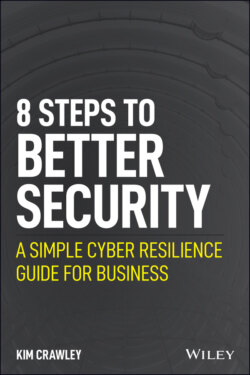Читать книгу 8 Steps to Better Security - Kim Crawley - Страница 9
Hackers Are the Bad Guys, Right?
ОглавлениеWhen most people hear the word hacker, they think of cybercriminals. Apparently, hackers are the bad guys. This is a misconception that's not only reinforced in Hollywood movies and TV shows but also in the news. When cyberattacks are covered in TV news shows, newspapers, magazines, and online news sources, the bad guys who perpetrate the crimes are called hackers. Those of us who promote a more accurate use of the word face an uphill battle with the public consciousness.
One of my favorite books of all time is Steven Levy's Hackers. It was published by Dell, Penguin, and O'Reilly in various editions between 1984 and 2010. That book is one of the best ways to learn about the history of actual computer hackers, beginning with the first proper electronic computer, ENIAC, deployed in 1948. Levy covers the history of hacking from the 1950s onward.
Hackers are people who find new and innovative ways to use computer technology. Some of the people who became famous billionaires in the tech industry, such as Steve Wozniak, Steve Jobs, Bill Gates, and Mark Zuckerberg, started as hackers themselves. In fact, the street address of Facebook's Menlo Park, California, headquarters is 1 Hacker Way.
Hackers developed the computer technologies you use every day: the TCP/IP backbone of the modern internet, the Linux kernels of the Android systems and Red Hat servers you interact with whether or not you're aware, the GNU Public License and MIT Public License, much of the open-source code you directly or indirectly use was published under, and so on.
Hacking can develop useful new technological applications. But hacking can also be used harmfully. The general public seems to have focused on the latter connotation of the word hacker in lieu of its original meaning.
Many computer programmers, cybersecurity professionals, software engineers, and other computer technology specialists call themselves hackers, in the spirit of the original meaning of the word. If someone innovates with computer technology, you can safely call them a hacker.
I'm an advocate of an organization called Hacking Is Not a Crime, led by my friends Bryan McAninch, Chloé Messdaghi, and Phillip Wylie. Wylie is also the coauthor of the first book I cowrote for Wiley, The Pentester Blueprint. The book you're reading right now is my debut solo work for Wiley. And Wylie isn't related to Charles Wiley, who founded this company back in 1807. But perhaps this illustrates how tight knit the cybersecurity and hacker communities are: we tend to know each other quite well.
I'm an idea person within the cybersecurity community, so my contribution to Hacking Is Not a Crime's mission to promote the positive use of the word hacker is to use my work in the media and writing books like this in a mindful and responsible way. During the many years I have been writing about cybersecurity and hacking, I always refer to the people who use computer technology to harm as cyberattackers, cybercriminals, or cyber threat actors. This distinction is a vital pillar of both cybersecurity culture and hacker culture.
Even if you're 100 percent businessperson and 0 percent computer geek, understanding this will help you work with cybersecurity professionals and foster a strong security culture.
